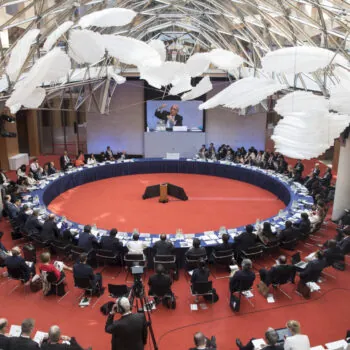The German government has announced its intention to develop a climate foreign policy. This briefing outlines a whole-of-government foreign policy vision for accelerated 1.5C transition pathways and climate impact preparedness underpinned by a ‘New Paradigm for Climate and Development’.
Summary:
- The current state of emissions trajectories and adaptation preparedness call for a new phase of climate action implementation. IPCC scientists, climate activists, defence experts, economists, and local communities are all clear that a step change in climate action is needed for global climate security. Coordinated deployment of foreign policy levers can incentivise and facilitate the necessary pathways globally, but a new vision for climate-centred foreign policy is needed.
- New forms of diplomacy at the bilateral level can help drive individual countries to act. But new forms of multi- (and pluri-) lateral cooperation are needed: a ‘New Paradigm for Climate and Development’. Otherwise, we will have a hodgepodge of inefficient, uncoordinated approaches to decarbonisation, swathes of poorer countries being left behind, or major gaps in regional resilience exacerbating instability and conflict. A new global cooperation paradigm can also provide a pathway through current geopolitical tensions.
- German Foreign Minister Annalena Baerbock’s vision for a Climate Foreign Policy and the country’s influence in the global market-shaping power of the EU put Germany in prime position to lead the way on deploying whole-of-government foreign policy for accelerated 1.5C transition pathways and climate impact preparedness underpinned by a ‘New Paradigm for Climate and Development’. Set up the right way, climate foreign policy could make a decisive contribution to addressing multiple crises in the short and long term. It can set Germany and its partners on a sustainable path that leaves no one behind.
Germany’s Climate Foreign Policy Strategy should aim to:
- Build globally harmonised high ambition rules, standards, carbon prices and non-price measures that incentivise faster economic sector decarbonisation while supporting capacity and technology to meet ever-ratcheting targets and standards.
- Mould climate and development finance architecture to facilitate flows of the trillions needed to support climate-aligned development pathways, managing global impacts, resetting north – south equity in a new North/South ‘grand bargain’
- Champion coherence in the multilateral climate governance framework for accountability and shared learning. Put resilience and a level-up in global north – global south solidarity at the centre.
- Centre climate goals in German energy diplomacy, security policy and overseas investment strategy.
- Deploy bilateral diplomacy and partnerships to incentivise, facilitate, and co-learn accelerated pathways for decarbonisation and resilience building.
Germany will need to underpin its policy by maintaining high standards in its and the EU’s own climate transition away from fossil fuels. The current ‘dash for gas’ resulting from Russia’s invasion of Ukraine must be contained. Germany and the EU must lead by example. The Foreign Office must lead on articulating the Climate Foreign Policy vision of a ‘New Paradigm for Climate and Development’ and mainstream it across federal ministries and all international engagements.


